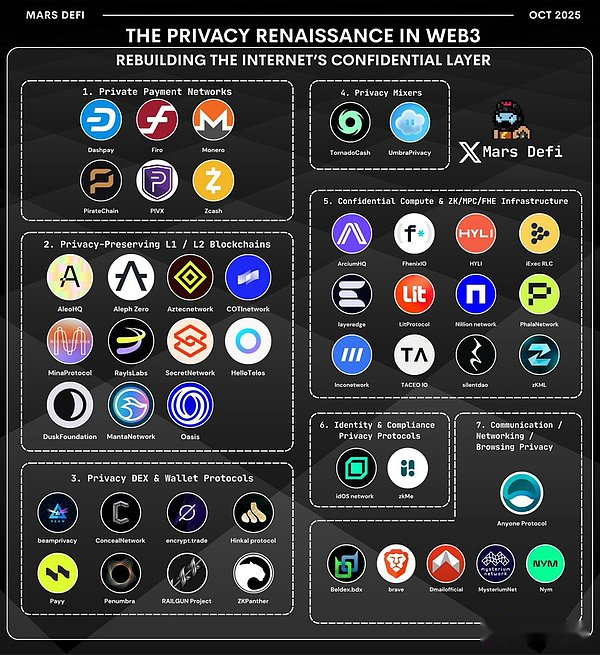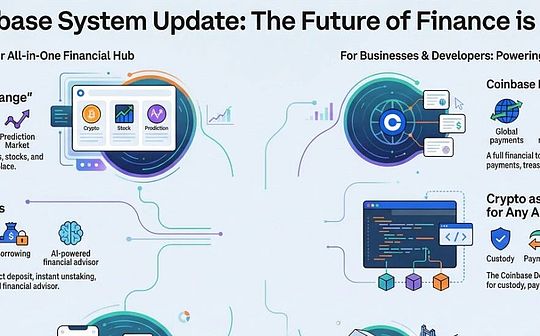
Author: Mars_DeFi, encryption analyst; Translation: Bitcoin Vision xiaozou
In the Web3 world, privacy is often overwhelmed by issues of decentralization, self-hosting, and transparency, but its criticality cannot be ignored.
In an ecosystem built on a public ledger, all actions are visible to anyone with a block explorer.While this ensures accountability, it also takes away our right to keep parts of our digital lives private.
Today, many projects are reshaping privacy as a core feature of decentralized architecture through advanced technologies such as zero-knowledge proofs, secure multi-party computation, trusted execution environments, and currency mixing networks.
Privacy innovation has penetrated multiple technology levels:
• Privacy public chain and private network
• Coin mixing network and confidential computing platform
• Emerging privacy SDKs, wallets and cross-chain bridges are lowering the threshold for developers to embed privacy features into user experiences
Let’s take a closer look at representative projects shaping the future of Web3 privacy.

1, privacy payment network
• Dash — focused on privacy and speed.Its core privacy function, PrivateSend, enhances transaction anonymity through currency mixing technology to ensure that the source of funds cannot be traced.
• Firo – a privacy project using the advanced cryptography protocol Lelantus Spark to provide untraceable financial transactions.Users can “destroy” tokens to clear transaction history and redeem new tokens that cannot be linked to ensure anonymity.
• Monero – an open-source privacy cryptocurrency that hides the identity of both parties and transaction details through stealth address, ring signature and ring confidential transaction technology.
• Pirate Chain — A privacy coin that is blocked by the entire network by default, using zk-SNARKs to achieve complete anonymity in peer-to-peer transactions.
• PIVX – a private public chain based on proof-of-stake consensus, and its custom zk-SNARKs privacy protocol SHIELD allows users to fully control financial data.
• Zcash – A peer-to-peer payment network using zk-SNARKs encryption technology, allowing users to choose transparent or private transaction modes.
2, privacy protection typeLayer1/Layer2Blockchain
• Aleo – a Layer 1 public chain that uses zero-knowledge proof to build a programmable and default privacy operating environment for decentralized applications, ensuring network security and integrity while providing verifiable private computing capabilities.
• Aleph Zero – a privacy-enhanced public chain that integrates zero-knowledge proofs and secure multi-party computation, providing auditable privacy feature options through its core privacy framework zkOS.
• Aztec – a privacy-first ZK Rollup solution on Ethereum that supports programmable confidential smart contracts and transactions, and uses cryptography technology to allow users to independently control the visibility of information.
• COTI — Coti V2 is Ethereum Layer 2 based on obfuscated circuits. This cryptography method supports secure multi-party computation of encrypted data, achieving privacy protection for transactions, artificial intelligence and DeFi applications.
• Oasis – A Layer 1 public chain designed for confidential smart contracts and decentralized applications. Its Oasis privacy layer allows developers to integrate privacy functions in EVM-compatible networks.
• Dusk – a Layer 1 blockchain that realizes confidential transactions and asset tokenization through privacy-protecting smart contracts, simple authentication protocols and zero-knowledge proof technology.
• Telos – a technology suite to create private transaction functions for the Telos blockchain, integrating the SNARKtor protocol, Plonky2 proof system and hardware acceleration technology to build a scalable and cost-optimized privacy solution.
• Manta Network — A modular blockchain ecosystem using zero-knowledge proofs to provide scalable privacy-enhanced applications for Web3, improving transaction confidentiality while solving interoperability and scalability challenges.
• Mina Protocol — The Layer 1 public chain that uses zk-SNARKs zero-knowledge proof can verify the calculation process without leaking the underlying data, and serves as a privacy gateway between the real world and decentralized applications.
• Rayls – a hybrid architecture blockchain that integrates traditional financial private subnets and DeFi public chains. Its cryptographic framework based on the Enygma privacy layer provides differentiated confidentiality guarantees for different scenarios.
• Secret Network – a privacy smart contract public chain with default data encryption, which builds an encrypted computing security zone through privacy hardware, allowing users to fully control data access permissions.
3,privacyDEXAgreement with wallet
• BeamPrivacy – A confidential cryptocurrency and DeFi platform that focuses on privacy and scalable transactions. It hides sensitive information such as addresses and amounts of both parties to the transaction by default, ensuring that the entire transaction is private.
• Conceal.Network — A censorship-resistant private DeFi and encrypted communication platform that enables untraceable anonymous transactions and on-chain encrypted message transmission through cryptographic protocols.
• encrypt.trade — Solana’s ecological privacy trading protocol uses end-to-end encryption technology to achieve seamless private transactions and transfers, and provides a tool suite to protect the privacy of users’ on-chain activities.
• Hinkal – A privacy smart contract wallet protocol that combines zk-SNARKs with stealth addresses, allowing users to interact with decentralized applications without revealing transaction history, asset balances and identities.
• Payy – an on-chain privacy bank with stablecoins as its core, providing private transaction services through non-custodial wallets, ZK-powered Visa cards and its ZK Rollup network Payy Network.
• Penumbra – a fully private blockchain and DEX built for the Cosmos ecosystem. It uses zero-knowledge proof to encrypt transaction data, ensuring that only the sender and receiver can decrypt the details. It supports selective disclosure, privacy pledge and governance functions.
• RAILGUN – a privacy protocol based on zero-knowledge proof that can hide wallet balances, transaction records and DeFi activity tracks to achieve completely anonymous transactions.
• Panther Protocol — a multi-chain privacy protocol that combines zero-knowledge proof and other technologies to allow users to control data visibility, ensuring transaction confidentiality while meeting compliance requirements.
4, privacy mixer
• Tornado.Cash — a decentralized, non-custodial cryptographic mixer that uses zero-knowledge proof to cut off the on-chain association of transaction sending and receiving addresses and enhance Ethereum ecological financial privacy protection.
• Umbra – a cryptographic protocol that provides transaction confidentiality for the Solana ecosystem, using Arcium’s secure multi-party computing technology to ensure privacy while ensuring the verifiability of payments and DeFi interactions.







